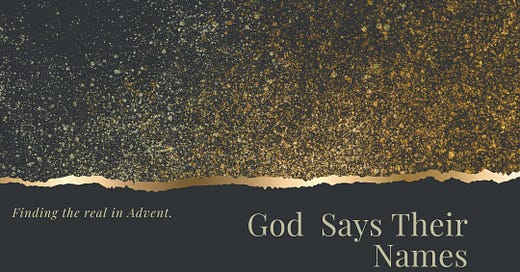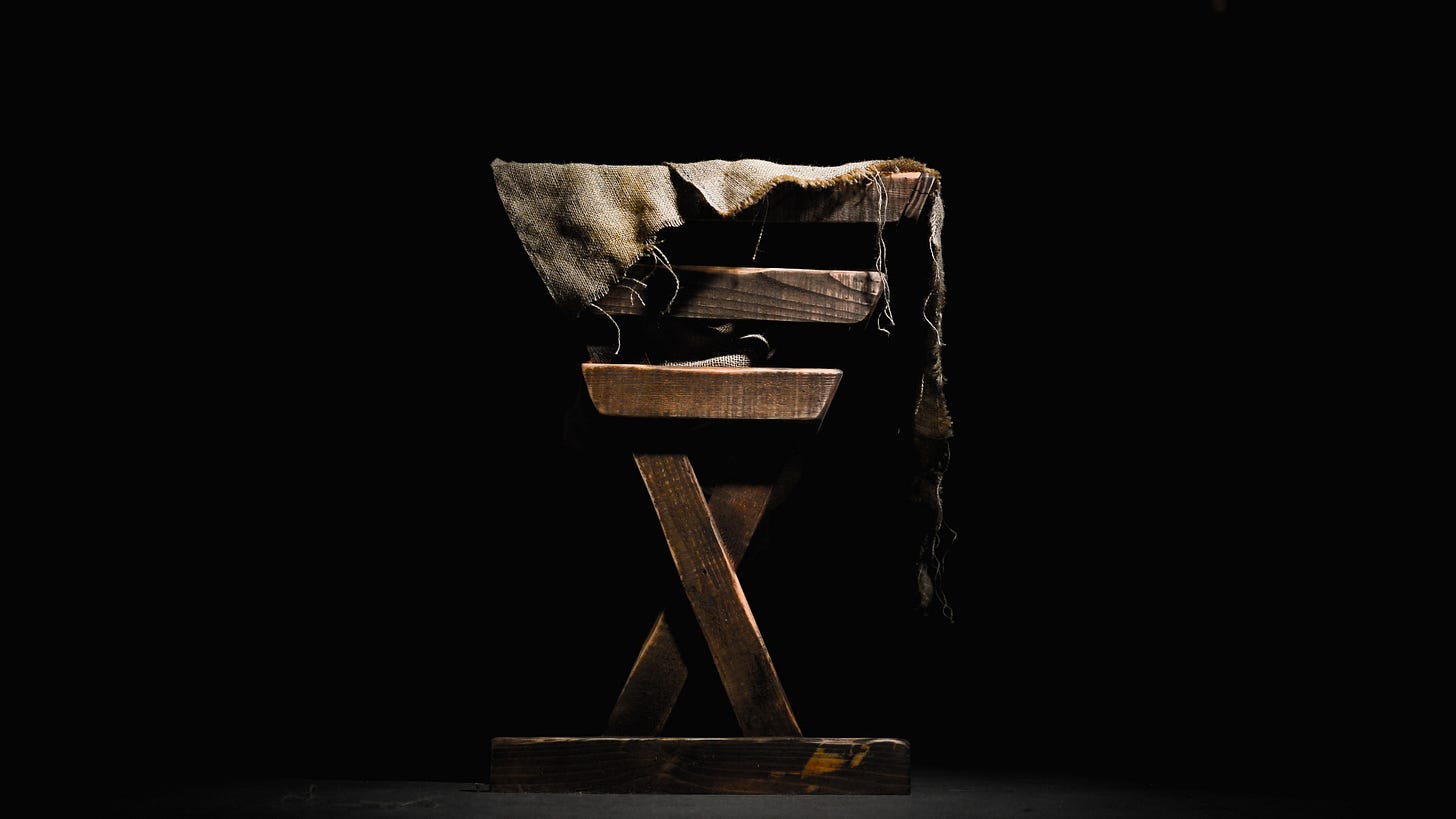Advent, for Christians, is the season of hope writ large. As the venerable C.S. Lewis famously said about Advent,
“In the Christian story God descends to re-ascend. He comes down; down from the heights of absolute being into time and space, down into humanity…down to the very roots and seabed of the Nature he has created. But He goes down to come up again and bring the ruined world with him.”
With quaint creche Christmas scenes depicting Mary, Joseph, and the baby Jesus alongside shepherds, wisemen, and various farm animals, the raw and shocking hope described by Lewis is often reduced to sentimentality. We may quickly glance at the nativity scene on the church’s front lawn while narrowly making it to our Christmas Eve candlelight service, or we may conjure the familiar picture of baby Jesus in our minds while singing Silent Night, but the warm feelings this invokes aren’t in proportion to the paradigm-shattering message contained within the story of Advent.
This Advent season, here at The Golden Thread and on my podcast The Gold Digger Show, we’ll be taking a different approach by exploring some of the darker themes that are often overlooked in our pre-packaged Christmastime lessons.
Don’t get me wrong, I’m as sentimental as the next person. I love Christmas carols, candlelight services, and manger scenes. I relish the warmth and simple joy that has always grown inside of me each year during this time. Yet, in this season of disenchantment with everything that I’ve found myself in lately, I’m not content with invoking the warm-and-fuzzies this year. The invitation from the Spirit this year appears to be one of looking a little more deeply, a little longer, and a little more lovingly at some parts of the Advent narrative that push against our comfortable boundaries. As I’ve said before, many of us are craving the real after becoming disillusioned with the parts of Christianity that are man-made and man sustained. We hunger and thirst for the real and living God.
Today our conversation partners will be an unlikely group of women who the gospel writer Matthew included in the genealogy of Jesus. Their names are Tamar, Rahab, Ruth, and Bathsheba (the wife of Uriah), and their placement in the genealogical account of Jesus’ descent is unusual because they are all women of questionable repute. The New Oxford Annotated Bible notes that genealogies are common in the Hebrew Bible and were a matter of pride and importance for demonstrating one’s status as a true Israelite. Matthew’s purpose in providing Jesus’s lineage is even more transcendent, as he seeks to establish that David and Abraham were Jesus’ forebears, setting the stage for his status as Messiah of the world to make sense.
What doesn’t make sense, then, is the inclusion of the names of the four women.
Biblical scholars, theologians, and everyday Bible readers have scratched their heads over why exactly Matthew would include women at all (which was not customary), much less four of “questionable repute,” in this genealogy which is supposed to be a matter of pride and critical importance in establishing Jesus’s title as “King of Israel?” Consider the dark and twisted nature of these women’s stories, which we will not gloss over today in our search for what’s real in this Advent story.
Tamar is known for tricking Judah into impregnating her after he sent her away in disgrace because she failed to conceive with his two sons before they died.
Two times married, with no child and only two dead husbands to show for it. This was a woman who had no agency when it came to who she wed, the Jewish practice of levirate marriage meant that she would simply be passed down from eligible man to eligible man within Judah’s family. This is difficult for us to understand in 2023, but this practice served as social security for her, meaning she would be vulnerable and disgraced for the rest of her life if she obediently waited for Judah to make good on his promise despite the evidence that he had no intention of doing so. Tamar did what she had to do and claimed her agency as a matter of survival. When her scheme and its outcome were revealed, Judah declared her to be more in the right than he after he failed to treat her in accordance with decency and God’s provision for vulnerable women (Gen 38:26).
Rahab was a Canaanite prostitute known for helping Israel defeat the city of Jericho and, afterward, integrating into the Jewish community.
She lived the rest of her life known as a foreigner who was once a prostitute and was only spared death because she betrayed her own people. Even as she lived among the Jews, her story was known and preserved. It is highly unlikely that she was ever fully accepted, much less fully respected, among the Israelites.
Ruth was a Moabite woman who married a Jewish man.
The Jews were forbidden to associate with the Moabites, much less marry them, as they were sworn enemies. Yet, after her husband and his father and brother died, she pledged herself to his mother Naomi and to her people, the Jews. She traveled to Naomi’s hometown where they took their place as two vulnerable and desperate women. Ruth began gleaning wheat for their daily food in the fields of a good man named Boaz. He was kind to her and had a familial tie through her husband, so Naomi encouraged Ruth to literally cast herself upon Boaz in hopes that he would save them both through marrying Ruth. This was an incredibly risky plan. One night, Ruth went to Boaz as he was sleeping, lay down next to him, and “uncovered his feet” (which is a reference to his lower body, possibly even his genitals). When he awakened, shocked to find her there, Ruth then further astonishes by proposing marriage, which Boaz eventually accepted.
Bathsheba, the wife of Uriah, is the woman that King David lusted after and then used his authority to sleep with while her husband was away at war.
After finding out she conceived, David then had her husband killed and took Bathsheba as one of his many wives. After experiencing the devastating loss of her child, Bathsheba eventually gives birth to another son who becomes King Solomon. Matthew subversively does not name her directly, referring to her not as the wife of David, but of Uriah.
Why does Matthew want us to remember these women and to understand their roles in bringing forth the Savior of the World? Why would he risk including these dark stories and injustices when his purpose is to establish Jesus as the Messiah? It makes no sense.
Unless.
It makes no sense unless the Spirit of God wants to communicate something so shocking that it’s difficult for me to even type.
What if the message held in the otherwise nonsensical inclusion of these four women is something like this?
From the moment darkness came billowing into the world like an overwhelming cloud, God’s light has been working through all things like the unseen yeast and the underground seeds Jesus so often referenced.
All things means just that – all. Where we’ve committed violence and sin and injustice, God has planted seeds of shalom to come. Those we’ve subjugated, God has exalted. The ones we’ve excluded, God has deemed indispensable to the plan. When all seemed lost, the light was working like a computer virus in the mainframe of evil to ensure the victory would come, but in a way that would take most by surprise.
When we demand salvation through kings like David, patriarchs like Judah, warriors like the ones at Jericho, and respectable ones like Boaz, God presents them standing next to Bathsheba, Tamar, Rahab, and Ruth.
God birthed Godself into the world through all these unlikely people and dark events, highlighting for us the bare truth that the high among us have no reason to be so proud and the lowly among us have no reason to be so ashamed. Not when we are standing in this kind of equalizing Light.
“In the beginning was the Word, and the Word was with God, and the Word was God. He was in the beginning with God. All things came into being through him, and without him not one thing came into being. What has come into being in him was life, and the life was the light of all people. The light shines in the darkness, and the darkness did not overtake it.” – John 1: 1-5
Matthew shouldn’t have included these women, not if he wanted to establish the kind of Kingship this misguided world craves. Yet, the Light disagrees with that logic. While the world would prefer to keep these stories hidden, and the pivotal roles these lowly ones played in the Divine Story unmentioned, God decides that something is essential to the Story, as a matter of pride and critical importance.
And this essential something is their names.
Tamar the disgraced. Rahab the prostitute. Ruth the desperate. Bathsheba the abused.
These four unlikely women, proof for all eternity that the light does indeed shine in the darkness, and the darkness did not overtake it.
Not for them back then, and not for us here now.
What darkness have you been afraid to allow into the light, dear one? What have you been afraid to name?







